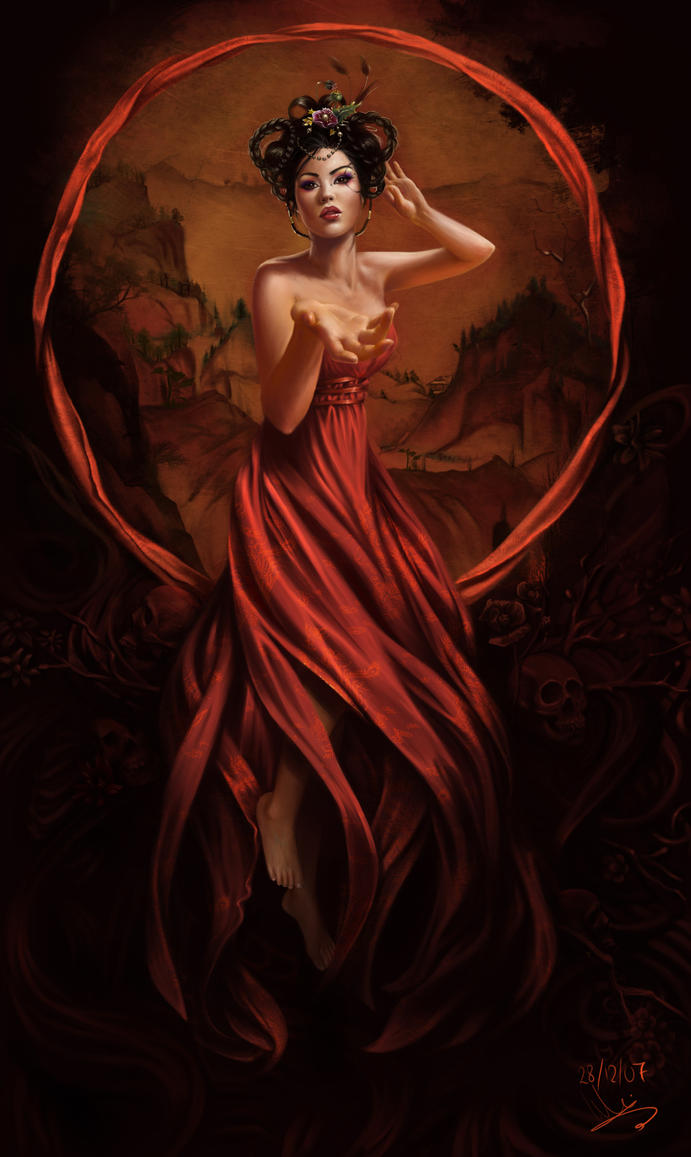UNFAITHFUL
An empty world you gave while you left
I look through the window pane,
hoping you would come back soon.
The candles that warmed our night have gone dim,
Casting shadows of dark memories.
hoping you would come back soon.
The candles that warmed our night have gone dim,
Casting shadows of dark memories.
I heard her charms are great opium.
In her, were lust and fantasies,
but realities are treasures you seek.
Rumours have it she left you for good,
While you roam the street lone and homesick.
If you would come back home,In her, were lust and fantasies,
but realities are treasures you seek.
Rumours have it she left you for good,
While you roam the street lone and homesick.
The keys lie still beneath the rug.
what's left of my bleeding heart is yours to keep
With these cracks, you'll have to live...
....wishing you never left in the first place.

Opium -- Chen Wen-Xi
Ancient priests used opium as a proof of their healing power. In Egypt its use was restricted to priests, magicians, and warriors; invented by Thoth (who also invented writing, astrology, mathematics, geometry, land surveying, medicine, botany, theology, civilized government, and oratory, and credited with making the calculations for the establishment of the heavens, stars, Earth,and everything in them; without his words, the gods would not exist) and given by Isis ("more clever than a million gods," whose magic was greater than that of any of the other deities) gave it to Ra the sun god to treat a headache. A statue of the Minoan "goddess of the narcotics," wearing a crown of 3 opium poppies, along with a simple smoking apparatus, was found in Gazi, Crete (near Heraklion); they are dated to ca. 1300 BCE. The Greek deities Hypnos (Sleep), Nyx (Night), and Thanatos (Death) were depicted wreathed in poppies or holding them, and poppies also adorned statues of the Apollo (god of music, poetry, truth and prophecy, healing, and the sun and light), Asklepios (god of medicine), Hades (god of the underworld), Demeter (goddess of agriculture and the harvest as well as the cycle of life and death), Aphrodite (goddess of love), and Kybele (who rode a lion-drawn chariot, accompanied by wild music, wine, and a disorderly, ecstatic following). In the 1st century Aulus Cornelius Celsus' "De Medicina" described the use of opium or a similar preparation; not long after its rediscovery and translation Philippus Aureolus Theophrastus Bombastus von Hohenheim called himself "Paracelsus" (the equal or superior of Celsus); in 1527 he returned from Arabia with a sword that contained within its pommel "Stones of Immortality" compounded from opium thebaicum, citrus juice, and "quintessence of gold;" thus laudanum was introduced to Europe. In the 1660s Thomas Sydenham, the "father of English medicine," claimed that "Among the remedies which it has pleased Almighty God to give to man to relieve his sufferings, none is so universal and so efficacious as opium." In 1821 Thomas De Quincy published "Confessions of an English Opium-Eater," which had been credited with beginning the Western tradition of addiction literature: "Oh! just, subtle, and mighty opium! that to the hearts of poor and rich alike, for the wounds that will never heal, and for 'the pangs that tempt the spirit to rebel,' bringest an assuaging balm; eloquent opium! that with thy potent rhetoric stealest away the purposes of wrath; and to the guilty man, for one night givest back the hopes of his youth, and hands washed pure of blood; and to the proud man a brief oblivion for 'Wrongs undress'd and insults unavenged;' that summonest to the chancery of dreams, for the triumphs of suffering innocence, false witnesses; and confoundest perjury, and dost reverse the sentences of unrighteous judges; -- thou buildest upon the bosom of darkness, out of the fantastic imagery of the brain, cities and temples beyond the art of Phidias and Praxiteles [the most renowned of Greek sculptors]... and 'from the anarchy of dreaming sleep' callest into sunny light the faces of long-buried beauties and the blessed household countenances cleansed from the 'dishonours of the grave.' Thou only givest these gifts to man; and thou hast the keys of Paradise, oh, just, subtle, and mighty opium!"
ReplyDeleteThank you for publishing and for a thorough research on opium. I never knew it has a long history
ReplyDelete